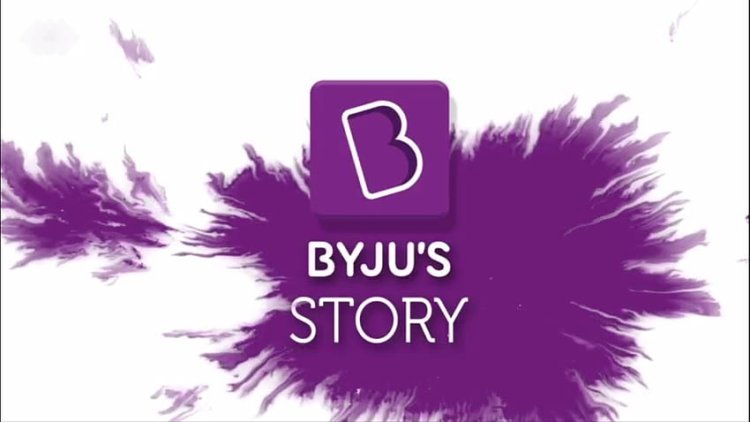The Rise and Fall of India's Ed Tech Giant: The Baiju Story
Dive into the dramatic rise and fall of India's EdTech giant, Baiju. Explore their meteoric ascent fueled by aggressive marketing and celebrity endorsements, followed by a devastating downfall marked by financial mismanagement. Can Baiju recover? Learn the cautionary tale and future prospects of Baiju.

Introduction
Welcome to the rise and fall of India's EdTech giant, the Baiju Story! In this blog, we're going to explore the incredible journey of Baiju, from its meteoric rise to its devastating downfall. Join us as we delve into the factors that contributed to Baiju's downfall, the aftermath of their financial mismanagement, and the potential for redemption. Get ready to uncover the fascinating story and the lessons that can be learned from Baiju's journey.
The Emergence of Baiju
In 2011, Baiju entered the world of education technology with a vision to transform learning. They quickly expanded their operations, captivating the nation with their innovative approach. The company's valuation skyrocketed to a staggering 22 billion dollars, making it the world's most expensive EdTech startup.
Baiju hired some of the biggest names in sports and entertainment to promote their brand, including Superstar Shahrukh Khan, cricketer Virat Kohli, badminton player PV Sindhu, and Olympic gold medalist Nera Chopra. They even signed global football star Lionel Messi as their global ambassador.
Their celebrity endorsements and creative marketing techniques quickly propelled Baiju's meteoric rise, successfully engrossing a sizable audience and gaining widespread recognition.
However, as the saying goes, "The higher the climb, the harder they fall." Baiju's downfall began when its valuation drastically decreased to 5.1 billion dollars, marking a downfall of over 75 percent. This marked the beginning of a challenging period for the once-thriving EdTech giant.
The aftermath was devastating, with Baiju laying off around 1,000 employees and facing allegations of financial mismanagement, including failure to pay PF money to most of its employees and deductions of taxes from employees without depositing them with the government.
In addition, both Google and Facebook suspended Baiju's accounts for running ads and failing to settle their dues. This series of events led to a tarnished reputation and a significant loss of public trust in the company.
Despite these challenges, Baiju has announced plans to launch an IPO for its subsidiary Akash, with hopes of regaining its footing and restoring investor confidence. It remains to be seen whether Baiju can recover from its downfall and regain its position as a prominent player in the education technology industry.
Baiju's Rapid Expansion and Brand Ambassadors
In 2011, Baiju entered the world of education technology with a vision to transform learning. They quickly expanded their operations, captivating the nation with their innovative approach. The company's valuation skyrocketed to a staggering 22 billion dollars, making it the world's most expensive EdTech startup.
Baiju hired some of the biggest names in sports and entertainment to promote their brand, including Superstar Shahrukh Khan, cricketer Virat Kohli, badminton player PV Sindhu, and Olympic gold medalist Nera Chopra. They even signed global football star Lionel Messi as their global ambassador.
Their celebrity endorsements and creative marketing techniques quickly propelled Baiju's meteoric rise, successfully engrossing a sizable audience and gaining widespread recognition.
However, as the saying goes, "The higher the climb, the harder they fall." Baiju's downfall began when its valuation drastically decreased to 5.1 billion dollars, marking a downfall of over 75 percent. This marked the beginning of a challenging period for the once-thriving EdTech giant.
The aftermath was devastating, with Baiju laying off around 1,000 employees and facing allegations of financial mismanagement, including failure to pay PF money to most of its employees and deductions of taxes from employees without depositing them with the government.
In addition, both Google and Facebook suspended Baiju's accounts for running ads and failing to settle their dues. This series of events led to a tarnished reputation and a significant loss of public trust in the company.
Despite these challenges, Baiju has announced plans to launch an IPO for its subsidiary Akash, with hopes of regaining its footing and restoring investor confidence. It remains to be seen whether Baiju can recover from its downfall and regain its position as a prominent player in the education technology industry.
The downfall begins.
The downfall of India's Ed Tech giant, Baiju, began in June 2023 when the company's largest non-founder shareholder drastically slashed its valuation to 5.1 billion dollars, marking a downfall of over 75 percent. This devastating blow led to a series of events that shook the company to its core.
One of the initial impacts of Baiju's downfall was the layoff of around 1,000 employees, signaling the start of a challenging period for the once-thriving EdTech giant. The aftermath was further compounded by allegations of financial mismanagement, including failure to pay PF money to most of its employees and deductions of taxes from employees without depositing them with the government.
Additionally, Google and Facebook suspended Baiju's accounts for running ads and failing to settle their dues, leading to a tarnished reputation and a significant loss of public trust in the company. Customers who bought courses on loan faced another issue when requesting cancellations and refunds, as Baiju continued paying EMIs on the loans instead of following protocol, leaving customers frustrated and disillusioned.
One significant contributing factor to Baiju's downfall was their aggressive marketing approach, which crossed the line between effective salesmanship and pressurizing potential customers. This approach instilled fear in parents about their children's future, eroding trust and creating a negative perception of the company.
Moreover, Baiju's overall strategy and financial missteps played a role in their downfall, with the company's failure to file timely financial reports, defaulting on a 1.2 billion loan payment, and incurring significant expenses in signing global brand ambassador Lionel Messi and sponsoring major events. These financial challenges, coupled with a surge in losses, added to the company's difficulties.
Despite these challenges, Baiju has announced plans to launch an IPO for its subsidiary Akash, with hopes of regaining its footing and restoring investor confidence. However, for long-term success, Baiju must rethink its marketing approach and prioritize a more customer-centric and responsible strategy to rebuild trust and recover from its downfall in the fiercely competitive world of education technology.
Financial Mismanagement and Allegations
Allegations of financial mismanagement marred the aftermath of Baiju's devastating downfall. The EPFO data revealed that Baiju's parent company, Think and Learn Private Limited, had failed to pay the PF money to most of its employees, leading to a significant loss of public trust in the company.
Rumors also circulated that the company had deducted taxes from its employees but failed to deposit them with the government, using the money for other purposes. This added to the company's misery, as both Google and Facebook suspended Baiju's accounts for running ads and failing to settle their dues.
Customers who bought courses on loan faced another issue when requesting cancellations and refunds. Baiju's response, instead of following the protocol, was to continue paying EMIs on the loans, leaving customers frustrated and disillusioned.
One significant contributing factor to Baiju's downfall was their aggressive marketing approach, which instilled fear in parents about their children's future, eroding trust and creating a negative perception of the company. This, coupled with the company's failure to file timely financial reports, defaulting on a 1.2 billion loan payment, and incurring significant expenses in signing global brand ambassador Lionel Messi and sponsoring major events, added to the company's difficulties.
Despite these challenges, Baiju has announced plans to launch an IPO for its subsidiary Akash, with hopes of regaining its footing and restoring investor confidence. However, for long-term success, Baiju must rethink its marketing approach, prioritize a more customer-centric and responsible strategy, and pave the way to redemption in the fiercely competitive world of education technology.
Factors Contributing to Baiju's Downfall
One significant factor contributing to Baiju's downfall was their aggressive marketing approach, which crossed the line between effective salesmanship and pressurizing potential customers. This approach instilled fear in parents about their children's future, eroding trust and creating a negative perception of the company.
Baiju's subsidiary, White Hat Jr., employed a controversial marketing strategy centered around a child prodigy named Wolf Gupta, claiming he had secured a job at Google for a staggering sum of 1.2 crores. This insinuated that children who did not enroll in their courses were wasting their lives, further alienating potential customers.
Baiju's overall strategy and financial missteps also played a role in their downfall. The company's failure to file timely financial reports added to doubts about its stability. Financial difficulties mounted as the company defaulted on a 1.2 billion loan payment and incurred significant expenses in signing global brand ambassador Lionel Messi and sponsoring major events.
Furthermore, Baiju's aggressive marketing tactics eroded trust and created a negative perception of the company. This, coupled with the surge in losses and their long-term auditor's resignation, added to the company's difficulties.
Aggressive marketing and negative perception
Baiju's downfall can be attributed to its aggressive marketing approach, which instilled fear in parents about their children's future. This pressurizing tactic eroded trust and created a negative perception of the company, leading to a loss of public trust.
One significant factor contributing to Baiju's downfall was their aggressive marketing approach, which crossed the line between effective salesmanship and pressurizing potential customers. This approach instilled fear in parents about their children's future, eroding trust and creating a negative perception of the company.
Baiju's subsidiary, White Hat Jr., employed a controversial marketing strategy centered around a child prodigy named Wolf Gupta, claiming he had secured a job at Google for a staggering sum of 1.2 crores. This insinuated that children who did not enroll in their courses were wasting their lives, further alienating potential customers.
Moreover, Baiju's overall strategy and financial missteps played a role in their downfall. The company's failure to file timely financial reports added to doubts about its stability. Financial difficulties mounted as the company defaulted on a 1.2 billion loan payment and incurred significant expenses in signing global brand ambassador Lionel Messi and sponsoring major events.
Baiju must rethink its marketing approach and prioritize a more customer-centric and responsible strategy to rebuild trust and recover from its downfall in the fiercely competitive world of education technology.
Financial Struggles and Missteps
Following the catastrophic downfall of Baiju, the company faced significant financial struggles and missteps that contributed to their challenges. These missteps included:
-
Failure to pay PF money to most of its employees
-
Deductions of taxes from employees without depositing them with the government
-
Suspension of accounts by Google and Facebook for failing to settle their dues
-
Continued payment of EMIs on loans instead of following the protocol for customer refunds
Moreover, Baiju's aggressive marketing tactics, financial mismanagement, defaulting on loan payments, and incurring significant expenses in signing global brand ambassadors and sponsoring major events further exacerbated their financial difficulties. These challenges, coupled with a surge in losses and the resignation of their long-term auditor, added to the company's financial woes.
Despite these challenges, Baiju has announced plans to launch an IPO for its subsidiary Akash, with hopes of regaining its footing and restoring investor confidence. However, for long-term success, Baiju must prioritize a more customer-centric and responsible strategy to rebuild trust and recover from its financial missteps in the fiercely competitive world of education technology.
Hope for Baiju's future?
Despite the challenges faced by Baiju, there is a glimmer of hope for the company's future. With plans to launch an IPO for its subsidiary, Akash, Baiju aims to regain its footing and restore investor confidence. However, long-term success will require a strategic shift in their approach.
Rethinking the marketing approach
Baiju's aggressive marketing tactics have eroded public trust and created a negative perception of the company. By rethinking its marketing approach and prioritizing a more customer-centric strategy, Baiju can rebuild trust and recover from its downfall in the competitive world of education technology.
Customer-Centric Strategy
By focusing on delivering true value and prioritizing the needs of their customers, Baiju can pave the way to redemption. A customer-centric and responsible strategy may be the key to rebuilding trust and establishing a sustainable future in the EdTech industry.
Ultimately, the path to redemption for Baiju lies in their ability to evolve and adapt to the changing landscape of education technology, proving their commitment to providing quality learning experiences and regaining the trust of their stakeholders.
The Path to Redemption
Despite the challenges faced by Baiju, there is a glimmer of hope for the company's future. With plans to launch an IPO for its subsidiary, Akash, Baiju aims to regain its footing and restore investor confidence. However, long-term success will require a strategic shift in their approach.
Rethinking the marketing approach
Baiju's aggressive marketing tactics have eroded public trust and created a negative perception of the company. By rethinking its marketing approach and prioritizing a more customer-centric strategy, Baiju can rebuild trust and recover from its downfall in the competitive world of education technology.
Customer-Centric Strategy
By focusing on delivering true value and prioritizing the needs of their customers, Baiju can pave the way to redemption. A customer-centric and responsible strategy may be the key to rebuilding trust and establishing a sustainable future in the EdTech industry.
Ultimately, the path to redemption for Baiju lies in their ability to evolve and adapt to the changing landscape of education technology, proving their commitment to providing quality learning experiences and regaining the trust of their stakeholders.



 admin
admin 










